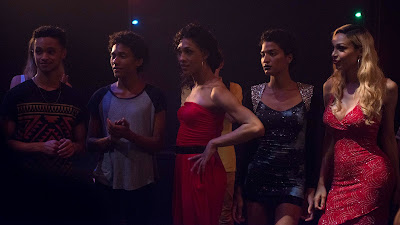TrustMovies must admit that he has never been overly taken with the idea or action of cross-dressing, neither by gays, straights, men or women. Yet he thoroughly enjoyed, back in 1976, seeing an Eve Merriam/Tommy Tune musical off-Broadway called The Club. And now, four decades later, comes along what I'd call a mini-movie-musical all about a gay male teenager who can't seem to help himself from trying on his mom's pretty shoes, which of course leads to something more. Entitled SATURDAY CHURCH and featuring maybe half a dozen musical numbers sung and danced by a hugely talented cast and written and directed by a first-time/full-length filmmaker, Damon Cardasis, this is a small, sweet, beautiful and often stunning piece of work.
Granted, the little movie (it lasts but 83 minutes) is a complete fantasy about finding fulfillment, love, friendship and family despite -- no, more because of -- who and what you are. Yet, given that, it is handled with such care and caring, such imagination and daring, and a genuine understanding of what a movie musical -- song, dance, color, atmosphere -- can do that it succeeds in taking us to that realm where, yes, anything can happen.
Mr. Cardasis, shown at right, creates a kind of alternate universe via his musical numbers, in which fantasy overtakes reality, trumping it via song and movement (dance is utterly vital to one number here, set in a homeless shelter) and allowing us to revel in what "could be" rather than what "is." Saturday Church may be an "if only" movie, but it is one that, within its tiny time-frame and universe, utterly works.
Each of the cross-dressing "voguers" (below, center and right) who befriend Ulysses at the "Saturday Church" he discovers are brought to fine life, as well. Each is given character, quirks and history so that they live and breathe fully enough to make us care for them.
Ditto the family of our hero, whose military-man father has just died as the film begins, and so his loving but over-worked mom must bring in Aunt Rose (Regina Taylor) to watch Ulysses and his little brother after school while mom works the night shift.
The movie manages to indict the Black church quietly but appropriately for refusing to include all god's creatures into its flock. The history of Black culture and the Black churches in terms of their treatment of the GLBT community has been dismal indeed, and that is brought to life via Aunt Rose and her attitude.
The musical numbers are small scale, highly impressionistic, and often break the fourth wall to address us overtly. They're handled with style and skill and beautifully sung. The final number, sung by mother to her son, is different however. It's direct and dead-on, and is, in fact, what every child wants to hear from his/her mom or dad but so rarely does. If its lyrics borrow (maybe unknowingly) from the classic Come Rain or Come Shine, it is still quite lovely and moving.
The weakness of Saturday Church -- it's so utterly feel-good and positive -- is so linked to its great strength that I suspect you will either embrace this movie or reject it out of hand. I'm for the embracing, as it took me places I have not been for a very long time, and in fact, thought I might never go again.
From Samuel Goldwyn Films, the movie opens this Friday, January 12, in Los Angeles at the Arena Cinelounge, and in New York City at the Village East Cinema, and nationwide on all digital platforms and via VOD.













No comments:
Post a Comment